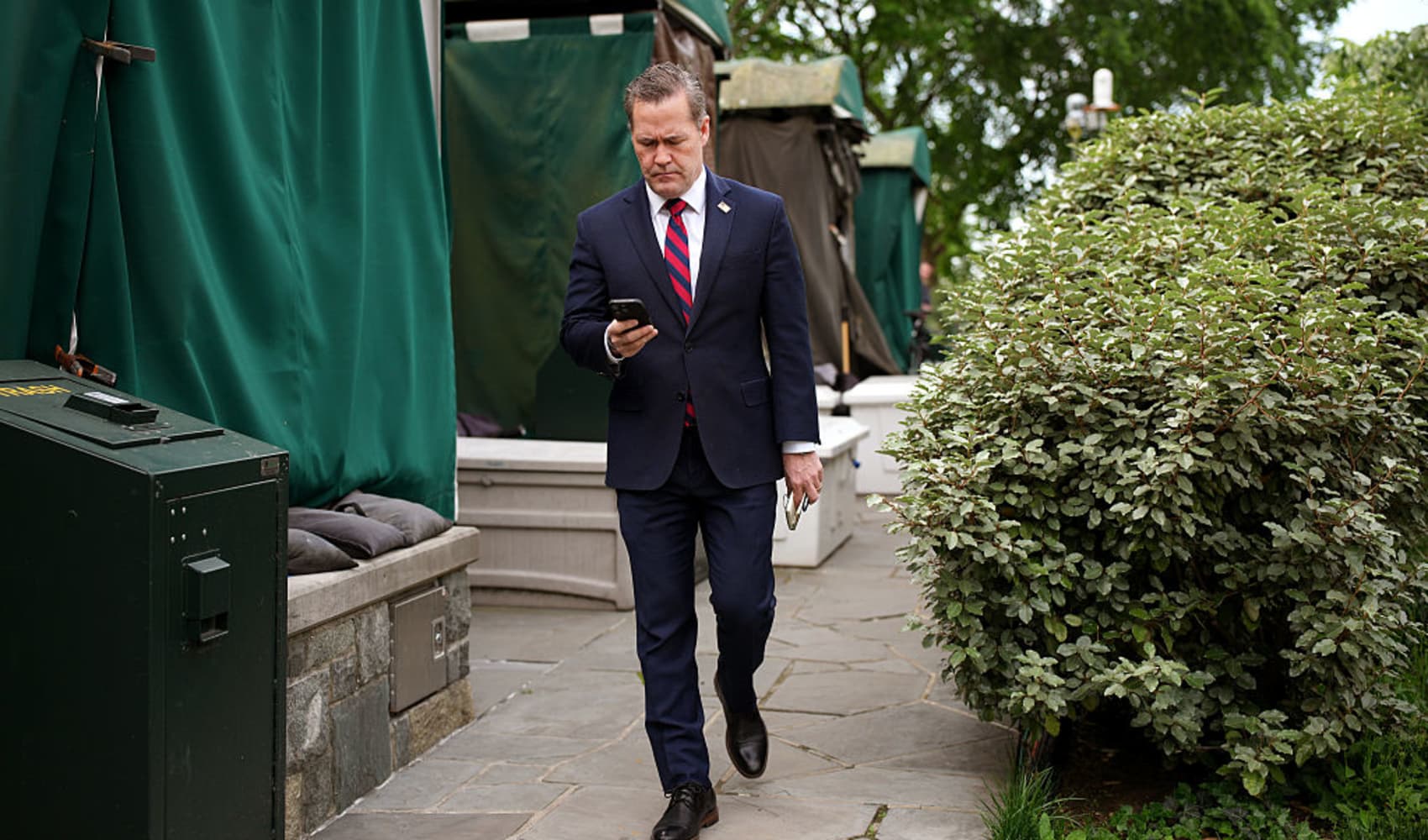Messaging App Hack Shuts Down: What You Need to Know
Trump Official's Messaging App Hacked: TeleMessage Suspends Operations
Introduction: A Digital Security Breach
In the ever-evolving landscape of digital communication, security breaches are becoming increasingly common, even among high-profile individuals. Recently, a messaging app used by a former national security advisor to President Donald Trump, Michael Waltz, has reportedly been hacked. This incident has prompted the app, TeleMessage, to temporarily suspend its services. This isn't just about one app or one official; it highlights the constant battle for digital security and the vulnerabilities we all face in the digital age. Is any communication truly secure anymore? Let's dive into the details of this breach and explore the potential ramifications.
The TeleMessage Suspension: What We Know
The messaging app at the center of this storm is TeleMessage. A spokesperson for Smarsh, the parent company of TeleMessage, confirmed that, "Out of an abundance of caution, all TeleMessage services have been temporarily suspended." This suspension indicates the seriousness of the reported hack and the company's commitment to protecting user data. But what exactly does this suspension entail, and what does it mean for its users?
What Does a Suspension Mean?
A service suspension typically means that users are temporarily unable to access the app's features, including sending and receiving messages. Think of it like a store closing its doors temporarily to fix a security flaw. The aim is to prevent further damage and ensure that the app is safe to use again.
Michael Waltz's Use of TeleMessage: A Matter of National Security?
The fact that Michael Waltz, a former national security advisor, was using TeleMessage raises questions about the security protocols in place for individuals handling sensitive information. A recent photo showed Waltz seemingly communicating on the app with several high-profile figures. This begs the question: Should individuals in positions of national security be using apps that are susceptible to hacks?
The High-Profile Contacts: Who Else Was Involved?
The photo in question indicated that Waltz was communicating with figures like Vice President JD Vance, Secretary of State Marco Rubio, Director of National Intelligence Tulsi Gabbard, and special envoy Steve Witkoff. The involvement of such prominent individuals underscores the potential significance of this security breach.
TeleMessage: A Closer Look at the App
TeleMessage is described as an Israel-founded app that acts as a modified version of Signal, a well-known encrypted messaging app. But how does it differ from Signal, and what security measures did it have in place before the reported hack?
TeleMessage vs. Signal: What's the Difference?
While both apps aim to provide secure communication, their underlying technologies and security protocols may differ. TeleMessage’s modification of Signal likely introduced changes, some of which may have inadvertently created vulnerabilities. It's like taking a well-engineered car and adding custom parts - sometimes, it works, and sometimes, it creates new problems.
The Hacker's Motives: What Were They After?
As of now, the hacker's motives remain unclear. It's unknown whether they were seeking financial gain, sensitive information, or simply aiming to disrupt the app's services. "The hacker of TeleMessage...has not obtained the messages of Waltz or t..." the report states, but the full extent of the breach may not yet be known.
Potential Ramifications of the Hack
Regardless of the motive, the potential ramifications of this hack are significant. Compromised messages could expose sensitive information, damage reputations, and even impact national security. It's a stark reminder of the importance of robust cybersecurity measures.
The Impact on Users: What Now?
For users of TeleMessage, the suspension of services can be disruptive. They may need to find alternative messaging apps and take steps to protect their data.
Steps Users Can Take to Protect Their Data
- Change passwords for all online accounts, especially those linked to TeleMessage.
- Enable two-factor authentication wherever possible.
- Be cautious of phishing emails and suspicious links.
- Monitor bank and credit card statements for any unauthorized activity.
The Broader Implications for Digital Security
This incident serves as a wake-up call for individuals and organizations alike. It highlights the need for constant vigilance and investment in cybersecurity. We live in a world where our digital lives are constantly under threat, and we need to be prepared.
The Importance of Cybersecurity Measures
Robust cybersecurity measures are essential for protecting data from hackers. These measures include strong passwords, encryption, firewalls, and regular security audits. It's an ongoing process, not a one-time fix.
The Role of Encryption in Protecting Communications
Encryption plays a crucial role in protecting digital communications. It scrambles messages so that only the intended recipient can read them. However, even encrypted apps can be vulnerable to hacks if their underlying security protocols are flawed.
Types of Encryption: End-to-End vs. Other Methods
End-to-end encryption is considered the most secure type of encryption, as it ensures that only the sender and recipient can read the messages. Other types of encryption may offer less protection.
The Future of Secure Messaging: What's Next?
The TeleMessage incident raises questions about the future of secure messaging. What steps can be taken to prevent similar breaches from happening again? Are there any truly "unhackable" apps?
Emerging Technologies in Secure Communication
Researchers are constantly developing new technologies to enhance secure communication. These technologies include advanced encryption methods, blockchain-based messaging, and quantum-resistant cryptography.
Regulation and Oversight: Is More Needed?
The fact that a messaging app used by a former national security advisor was vulnerable to a hack raises questions about the need for greater regulation and oversight of secure communication platforms. Should there be stricter standards for apps used by government officials and other individuals handling sensitive information?
The Balance Between Security and Privacy
Finding the right balance between security and privacy is a delicate task. While it's important to protect sensitive information, it's also crucial to uphold individuals' right to privacy. It's like walking a tightrope – one wrong step, and you fall.
Conclusion: Lessons Learned from the TeleMessage Hack
The TeleMessage hack serves as a stark reminder of the ever-present threat of cybercrime. It highlights the importance of robust cybersecurity measures, the need for vigilance, and the ongoing challenge of balancing security and privacy. The incident also underscores the need for individuals in positions of national security to use secure communication platforms that meet the highest standards of protection. This is a crucial moment to evaluate our digital security protocols and ensure that we are doing everything possible to protect our data and our communications. Ultimately, the TeleMessage incident is a lesson we all need to heed.
Frequently Asked Questions
- What is TeleMessage, and what was it used for?
TeleMessage is an Israel-founded messaging app designed to provide secure communication. It's a modified version of Signal, offering encrypted messaging services. It was used by individuals like former national security advisor Michael Waltz, reportedly for communicating with other high-profile figures.
- Why was TeleMessage suspended?
TeleMessage services were temporarily suspended "out of an abundance of caution" following a reported hack. The company aimed to protect user data and prevent further damage while investigating the security breach.
- What should I do if I was a TeleMessage user?
If you were a TeleMessage user, it's recommended to change your passwords for all online accounts, especially those linked to the app. Enable two-factor authentication wherever possible, be cautious of phishing emails, and monitor your financial accounts for any unauthorized activity.
- What does this incident say about the security of encrypted messaging apps?
This incident highlights that even encrypted messaging apps can be vulnerable to hacks if their underlying security protocols are flawed. It underscores the need for constant vigilance and investment in cybersecurity.
- What are some alternative secure messaging apps I can use?
There are several secure messaging apps available, including Signal, WhatsApp (with end-to-end encryption enabled), and Wire. Research and choose an app that aligns with your specific security needs and privacy preferences.

